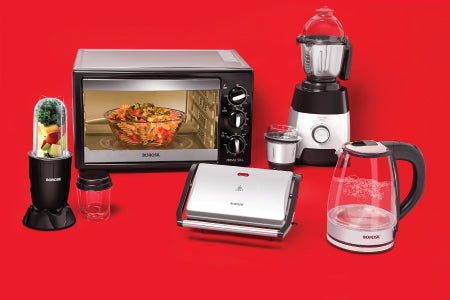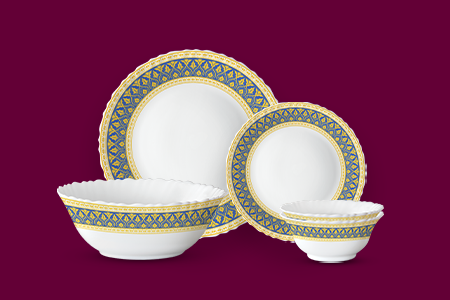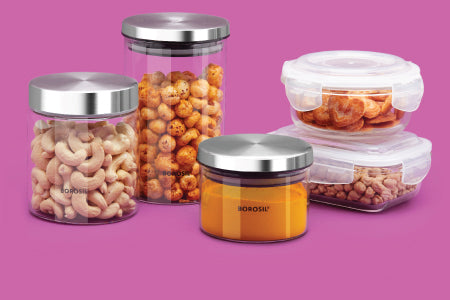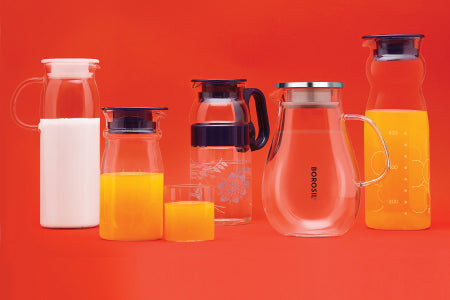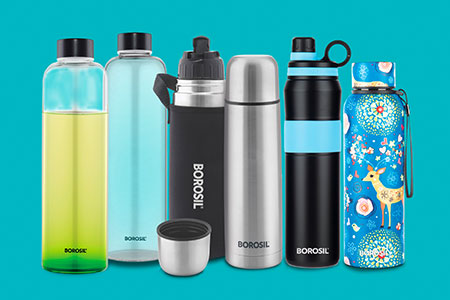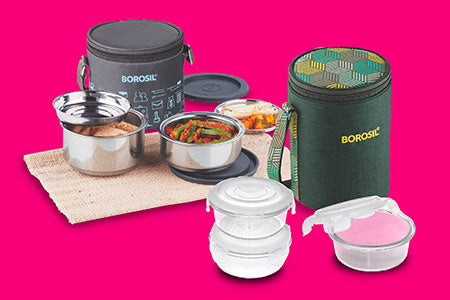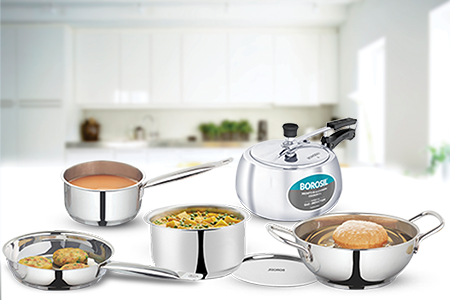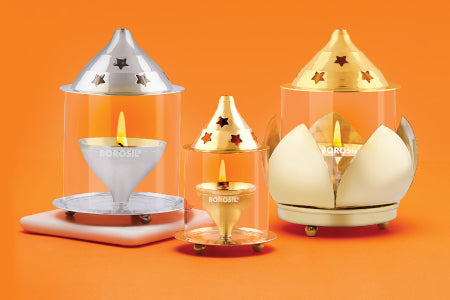
How To Clean And Maintain Your Glassware
Keeping your glassware clean and in good condition is an important task to ensure they last a long time and look great when you use them. Glassware can come in many different shapes, sizes and styles, so it's important to know how to properly clean and maintain them. Cleaning glassware can be simple and easy if you use the right techniques and products.
In this guide, you will learn how to:
1. Properly clean your glassware by hand
2. Safely load your dishwasher with glassware
3. How to store your glassware well
I - How to clean glassware by hand
To clean glasses by hand, you will need a mild detergent, warm water, and a soft cloth or sponge. Here are the steps to follow:
1. Rinse the glasses under warm water to remove any loose dirt or debris.
2. Fill a sink or basin with warm water and a small amount of mild detergent.
3. Gently wash the glasses, using a soft cloth or sponge, paying extra attention to any spots or stains.
4. Rinse the glasses thoroughly under warm running water to remove any soap residue.
5. Dry the glasses with a soft, lint-free cloth. Be sure to dry the rims and stems of the glasses as well, as they can be the most prone to water spots.
6. Avoid using abrasive materials or harsh chemicals when cleaning, as they can scratch the glass.
7. If the glasses have hard-to-remove stains, you can use a mixture of baking soda and water to gently scrub the glasses.
8. Avoid drying glasses with towels or paper towels as fibres can stick to the glasses and create scratches.
II - How to safely load glassware in your dishwasher
Loading a dishwasher with glassware can be a bit tricky, as you want to ensure that the glasses do not get damaged or break during the cleaning process. Here are some tips for loading a dishwasher with glassware:
1. Always check the manufacturer's instructions on your glassware to see if it is safe for dishwasher use before loading them.
2. Sort glasses by size and shape, and place the largest and heaviest glasses on the bottom rack.
3. Be sure to stagger glasses on the top rack so that they do not touch or bump against each other during the wash cycle.
4. Use the top rack for more delicate glassware such as wine glasses, champagne flutes, and crystal.
5. Do not overload the dishwasher, as this can cause glasses to break or become damaged.
6. Avoid using the heat-dry setting, as it can cause glasses to become too hot and warp or crack. Instead, opt for the air-dry setting or open the dishwasher door after the wash cycle to allow the glasses to air dry.
7. If you have any glasses with gold or silver rims, place them on the top rack and avoid using any detergents that contain chlorine or bleach, as they can discolour the metal.
8. If you have glasses with intricate designs or patterns, try to position them face-down in the dishwasher to avoid any damage to the design.
By following these tips, you can help ensure that your glassware is properly cleaned and safely loaded in the dishwasher.
III - How to store glassware
Proper storage of glassware can help ensure that they last a long time and stay in good condition. Here are some tips for storing glassware:
1. Store glassware in a dry place, away from direct sunlight or heat sources. This will help prevent discolouration and warping of the glass.
2. Avoid stacking glassware on top of one another, as this can cause scratches or chips. Instead, store them separately or in a way that they are not touching.
3. Use a towel or cloth to separate glasses if you must stack them, it will prevent scratches.
4. Avoid storing glassware in damp or humid areas, as this can cause mould or mildew to form.
5. Some glassware is not safe for use in the microwave or dishwasher, so check the care label before storing them.
6. If you have a large collection of glassware, consider using dividers or separate compartments to keep them organized and protected.
7. If you are storing glassware for a long period, consider wrapping them in bubble wrap or packing paper to prevent any damage during transportation or storage.
By following these tips, you can help ensure that your glassware stays in good condition and is ready to use when you need it.
How to Tell if Your Glassware is Truly Clean?
Now that you have understood how to clean glassware, it is also important to look for signs that tell you that your glass has not been cleaned properly and still requires some light scrubbing to get it squeaky clean.
Here are the tests you can do to determine whether your glass is truly clean.
1. Dip your glass tumbler in a bowl of room-temperature water. If the glass is truly clean, the water will evenly coat it once you gently lift it from the bowl. However, if it has not been cleaned properly, the even film of water will break into droplets on the surface. If you see water droplets running down your glass, it is time for another gentle rinse.
2. Take a wet glass and sprinkle some salt on the interior of the glass. If the glass is clean, the salt should stick to the surface in an even pattern, but if the glass is greasy, the salt will drop unevenly, showing an uneven pattern.
Likewise, you can easily determine whether your beer glass is clean or not by performing the following steps:
Is Your Beer Glass Clean? Check It Out
If you own beer glasses and enjoy after-work drinks, there are various ways to check whether your beer glass is clean or has residue left behind even after its last scrub.
For these tests, all you need is your beer mug and a bottle of your favourite beer.
1. Start by pouring the beer into the glass. If you notice bubbles sticking to the side of your glass after washing it, this could indicate that detergent and oils are still left behind. To solve this problem, rinse your glassware with warm water before washing them and use a clean sponge or cloth to wipe and dry.
2. Pour the beer and observe the head. If the foam seems to be disappearing quickly or is not clinging to the side walls of the glass, it is a clear indication that the glassware has not been cleaned properly and requires another rinse.
3. After pouring the beer, drink some and notice the glass walls. If the glass is squeaky clean, the beer should leave horizontal rings on the walls as you drink the beer. If there are no rings, it means the foam is not sticking to the surface of the glass as it should, and some residue is preventing it from clinging.
Carry out these three tests to check whether your favourite beer mug is clean enough for the next drink. If you suspect there might be oils from the last drink left, wash the glassware in warm water with a clean sponge to remove all residue left behind. Once your glass is squeaky clean, you can enjoy a cold beer mug with its head and foamy rings.
Essential Tips on “How to Take Care of Glassware”
If you want your glassware to last longer, there are certain things you should keep in mind while storing or using the glass to ensure proper care of glassware, adding a few more years to its durability and longevity.
1. Do Not Stack Glasses
You might have noticed many establishments stack glasses, one on top of the other, forming shapes and pyramids that look visually pleasing but harm the glassware. Many people like storing glasses by stacking them, but this is extremely risky and might cause chipping, breaking and cracking.
Moreover, if you happen to stack your glassware and if they are not stable without any support, any of the layers could give out, causing the entire collection to crash and break. So, you should always avoid stacking glasses to make sure the glasses do not suffer unpleasant scratches or are not at risk of cracking or breakage.
2. Ensure Storage Without Clinking
As one of the most delicate tableware, a basic prerequisite on how to store glassware is ensuring that it does not clink with other utensils or glasses. Clinking glasses, when stored, can cause chips on the rim and scratches on the surface; it might even result in major cracks due to the dress of the other utensils. Always store glasses separately in a safe place, with dividers in between to ensure they do not rattle.
Moreover, you might have also noticed a tradition of clinking glasses before drinking out of them at celebrations. Such clinking can also weaken your delicate glassware, putting them at risk of shattering or chipping. It is best to avoid clinking glasses; instead, raise a toast to celebrate!
3. Avoid Directly Scooping Ice
Placing ice cubes in the glass is a common necessity when preparing a cold drink. However, sometimes we tend to scoop ice directly into the glass, using the glass itself, instead of scooping the ice cubes using tongs or hands and adding them gently to the class. Since this can cause the glass to chip or cause scratches, it is best to gently add ice cubes to the glassware, one by one, ensuring it does not damage the glass.
Conclusion
Now that you have understood how to care for glassware, you must comprehend the importance of regular cleaning, wiping and properly storing glassware. It ensures your glassware looks newer and lasts longer without losing its charm. If you follow these common but often overlooked tips, you can easily avoid accidental glass breakage, ensuring your beloved glassware collections can be taken out on special occasions for years.





